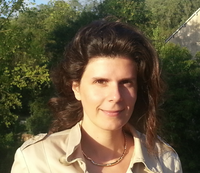Niki Trigoni

Professor Niki Trigoni
Themes:
Completed Projects:
Interests
Professor Trigoni's interests lie in intelligent and autonomous sensor systems with applications in positioning, healthcare, environmental monitoring and smart cities. Please contact her if you are interested in applying for a DPhil, postdoc or senior software engineer position in one of the following areas: Indoor positioning systems, data fusion, inference and learning from sensor data, human-robot interaction, communication protocols and quality assurance for sensor networks, innovative mobile sensing platforms and architectures including participatory and social sensing, sensor tasking, control, coordination, decision making and actuation. We currently have a number of funded open positions.
Biography
Niki Trigoni is a Professor at the Oxford University Department of Computer Science and a fellow of Kellogg College. She obtained her DPhil at the University of Cambridge (2001), became a postdoctoral researcher at Cornell University (2002-2004), and a Lecturer at Birkbeck College (2004-2007). At Oxford, she is currently Director of the EPSRC Centre for Doctoral Training on Autonomous Intelligent Machines and Systems, a program that combines machine learning, robotics, sensor systems and verification/control. She also leads the Cyber Physical Systems Group, which is focusing on intelligent and autonomous sensor systems with applications in positioning, healthcare, environmental monitoring and smart cities. The group’s research ranges from novel sensor modalities and low level signal processing to high level inference and learning.
News
- Nov 2017: If you are interested in doing a DPhil in Computer Science in the area of cyberphysical systems, please find information on how to apply here. Deadlines 8th January/9th March 2018.
- Nov 2017: Several funded PhD positions are available every year at the EPSRC Centre for Doctoral Training in Autonomous Intelligent Machines and Systems (AIMS) - directed by N. Trigoni and M. Osborne. It combines four themes: Robotics, Machine Learning, Verification&Control and Sensor&Actuator Networks. Next Deadline: 19th January 2018.
- Nov 2017: TPC chair of Sensys 2017, with Prof. L. Mottola
- June 2017: Trigoni and Markham receive a 3-year NIST grant to develop indoor positioning systems for emergency responders
- April 2016: TPC chair of IPSN 2016, with Prof. D. Culler and S. Nath
Selected Publications
-
mmPoint: Dense Human Point Cloud Generation from mmWave
Qian Xie‚ Qianyi Deng‚ Ta−Ying Cheng‚ Peijun Zhao‚ Amir Patel‚ Niki Trigoni and Andrew Markham
In British Machine Vision Conference (BMVC). 2023.
Details about mmPoint: Dense Human Point Cloud Generation from mmWave | BibTeX data for mmPoint: Dense Human Point Cloud Generation from mmWave | Download (pdf) of mmPoint: Dense Human Point Cloud Generation from mmWave
-
Beyond Fusion: Modality Hallucination−based Multispectral Fusion for Pedestrian Detection
Qian Xie‚ Ta−Ying Cheng‚ Jia−Xing Zhong‚ Kaichen Zhou‚ Andrew Markham and Niki Trigoni
In IEEE/CVF Winter Conference on Applications of Computer Vision (WACV). 2023.
Details about Beyond Fusion: Modality Hallucination−based Multispectral Fusion for Pedestrian Detection | BibTeX data for Beyond Fusion: Modality Hallucination−based Multispectral Fusion for Pedestrian Detection | Download (pdf) of Beyond Fusion: Modality Hallucination−based Multispectral Fusion for Pedestrian Detection
-
Illumination−Aware Hallucination−Based Domain Adaptation for Thermal Pedestrian Detection
Qian Xie‚ Ta−Ying Cheng‚ Zhuangzhuang Dai‚ Vu Tran‚ Niki Trigoni and Andrew Markham
In IEEE Transactions on Intelligent Transportation. 2023.
Details about Illumination−Aware Hallucination−Based Domain Adaptation for Thermal Pedestrian Detection | BibTeX data for Illumination−Aware Hallucination−Based Domain Adaptation for Thermal Pedestrian Detection | Download (pdf) of Illumination−Aware Hallucination−Based Domain Adaptation for Thermal Pedestrian Detection
Activities
- Cyber Physical Systems
- Workplace Autonomy
- Deep Learning Based Inertial Tracking
- Mobile and People-centric Systems and Sensing
- Intelligent Resource Constrained Systems
- Machine Learning Systems
- Distributed Sensing and Coordination
- Positioning in GPS-denied Environments
- Software Engineering
